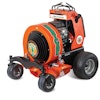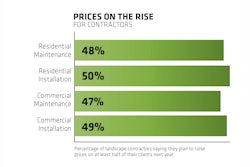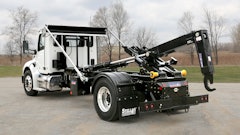
I often have contractors tell me that someday they want to be just like the Big Box Landscaper. The big guys have nice new equipment, all of the account managers and supervisors have their own vehicles, they have fancy offices, and they seem to be able to purchase whatever they need whenever they need it.
Before you get too excited, I will warn you that the Big Box Landscapers have their limitations as well. Somewhere up the food chain there is a group of individuals that is watching the day-to-day operations, and many people are accountable to produce results. The pressure is constantly on to make it happen.
All contractors—small, medium and big box—are faced with the same issues on a daily basis. Whether it is managerial, marketing, operational or financial, these issues confront all of us at different degrees, day in and day out. The question is: Who can handle them more effectively?
Let's take a look at nine key areas where the huge landscape companies might not have it as great as you think.
1. No Such Thing As Endless Capital
Many landscape contractors assume that if they had the “endless capital” like the big guys, their troubles would be over. Let’s get one thing straight: There is no such thing as endless capital.
Capitalizing your company takes time, a great plan, discipline and hard work. The Big Box Landscapers would like you to believe that they have cash available anytime they need it; that it's as simple as making a call to corporate and the funds will be sent. Though they probably have access to more capital than most landscape contractors, it does not mean that they can slide their ATM card and access cash whenever they want.
All businesses, large and small, need to operate within their budgets and financial plan. I work with small and large companies that have ample capital. Successful companies develop relationships with their bankers, and operate within their business and financial plans. Over time these companies have set up processes and controls that have produced financial success by continuously building up capital which has allowed them to grow.
Remember that most things are relative. The Big Box Landscapers may have to answer to investors, private equity firms, or even stockholders that demand an ROI. Most of us have to answer to ourselves and sometimes a banker.
2. Bad Cash Flow
When it comes to inadequate cash flow, size does not matter. In fact, small and medium-size companies may have a distinct advantage over the Big Box Landscapers.
Most contractors learned a lot about cash flow management over the past several years. When the economy took a slide back in 2007, it was easier for many of my small and medium-size companies to immediately scale back in order to preserve their cash. They did not have the pressure of having to deflate this fat and sassy operation that was fed by the ability to obtain cash whenever needed. When the well runs dry, it is dry!
It is a myth that the average landscape contractor is at a disadvantage when it comes to cash flow. The Big Box Landscaper may have a larger credit line and the ability to infuse more cash during tough times, but when they are forced to tighten their belt, it is much more difficult to loosen it as the economy improves.
All companies should practice proper cash flow management. Those where the owner signs on the dotted line have a much stronger pulse on the need to strictly manage their cash burn rate.
3. The Planning Process
Poor planning is the reason why problems like capitalization and bad cash flow can happen to landscape companies of any size and scope. All landscape companies need to map out as comprehensive a business plan as possible, covering financial issues, marketing, operations, growth, and an array of other elements. Granted, for the small and medium-size company, this can be time consuming, as a well-prepared plan can take weeks or months to complete.
Now here's the problem for the Big Box Landscapers in particular. Most small and medium-size landscape contractors prepare their plan and move forward with implementation. The really big companies get hung up in this process. I have been involved in this process on many different levels. The big guys may not even know when to end the planning process. They conduct meeting after meeting to discuss the same issues over and over. After a while you begin to realize that you are having long, lengthy meetings just to prepare for the next meeting.
Soon the systems, processes and procedures you have developed to help in the planning stage get tangled together—and an unprecedented amount of time is wasted. Most importantly, you lose focus on your goal of preparing and planning for the future. The larger companies are more apt to have a difficult time in the execution process because of their sheer size. Too many people involved in the process makes the communication and dissemination of information much more difficult.
Smaller companies are much more focused and have the ability to implement the planning process in a more timely manner.
4. Mushy Marketing
Your mother knows you are special, but what about your prospective and current customers? A marketing strategy that relies solely on the size of your organization is not going to work. The Big Box Landscapers love to tell their clients about their annual sales volume. Though a topic for conversation, it does not set you aside from your competition.
Small and medium-size companies often do a much better job of setting themselves apart so that customers can clearly see the advantages of working with them. Then, the marketing process needs to be in place 24 hours a day, seven days per week, and 365 days per year.
5. Inadequate Flexibility
From stacks of cash to battalions of employees, every small and medium-size landscape contractor knows the advantages a larger competitor brings to the game. But one thing the large Big Box Landscapers can’t necessarily do is turn on a dime. So that is something smaller and medium-size companies can exploit.
Never forget to remain flexible. If a service isn’t quite right or a marketing campaign isn’t really flying, don’t be afraid to tinker. Making those sorts of in-course adjustments is much more unwieldy for the big guys.
The Big Box Landscapers are forced to manage their employees and clients with their P&L statements. The human element as well as the commonsense approach to operating your business is thrown out the window when this is the mechanism used to measure success.
6. Efficiency in Focus, Customer Support Gets Blurry
When you are forced to operate your business using standard operating procedures without the flexibility of dealing with the issues at hand, your staff and clients will quickly become frustrated. The small and medium-size contractors have an easier time emphasizing complete customer support, from doing things you don’t have to do to offering thoughtful, useful advice that goes beyond the ordinary.
It is very difficult for the Big Box Landscaper to have their entire staff focus on quality, service, responsiveness, value and communication. But all members of your staff need to be focused on operating in a proactive manner. The larger the company, the more difficult it is to get everyone on the same page.
This mindset often gets lost in the hustle and bustle of the day-to-day activities in the larger companies. Though it may be something that they are thinking about, there are too many other corporate directives that must be completed.
7. Estimating vs. Buying Market Share
Small, medium and large landscape companies all need an estimating system in order to succeed in today’s competitive market for landscaping services. Most companies have a checks and balances system in place to make sure that this process is not abused.
At different times throughout the year, you may be under incredible pressure to produce estimates and make sales. The small and medium-size contractor is going to develop an estimating process and plan—and live by that system. These contactors will make sure that there is a set of internal controls in place to guard against a bunch of renegade estimators.
Unfortunately, Big Box Landscapers sometimes find themselves in a bit of a quandary when it comes to the estimating process. They are constantly under the gun to produce more revenue. The sales staff, which often is the estimating staff, finds itself in a position where it begins telling itself stories about a particular bid in order to reduce the price. The staff knows that nobody is going to check its work. The name of the game is new sales, after all.
The other myth is that because of their size, the Big Box Landscaper can do the work for less money. But remember that Material + Labor + Equipment + Subs = Price. Mere company size does not change the amount of any of these variables on a project.
Unfortunately, working for less money hurts everyone in a couple of different ways. First, some companies are putting work on the street for prices below what the market will bear, hoping that they can make up the margins with enhancements. But once you reduce the price of a project below market value, it is difficult to bring it back to the correct price.
Secondly, when you price work below the market price, your client suffers. There is no way that you can perform on a job if you do not have the correct amount of labor hours, material and equipment assigned to that project.
All contractors are affected by this push by the Big Box Landscapers to purchase market share.
8. Big Company, Mediocre Staff
Inexperienced and unmotivated staff can bring down a solid business—even a business with a knowledgeable management team. In their rush to obtain market share, large landscape companies often forget the need to hire and train field personnel.
Sometimes many of the Big Box Landscapers produce a country club atmosphere where everyone wants to be the boss. Many of the Big Box Landscapers have more than enough managers. In fact, they probably have more managers than they really need. This is not a “suite and tie” type of business where managers should be in meetings all day.
Your staff needs to be out in the field meeting with clients and spending time training new employees. When/if you are inundated with customer complaints, over very basic issues, you need to stop and ask yourself if your crews are properly trained and meeting the needs of your clients.
Not everyone can be the boss. You need key skilled supervisors, crew leaders and laborers to ensure that you produce a quality product.
9. Uncontrolled Growth
Ironic as it may seem, businesses that succeed too quickly often push themselves into an early grave. If your production fails to keep pace with your demand, or necessary expansion coincides with insufficient cash, the growth that you dream about can actually threaten your company's very existence.
I work with contractors of all sizes who want to grow their businesses. Most realize that it takes time, a well-developed plan and patience. The Big Box Landscapers do not have the same options when it comes to growth. They are under the gun to reach very aggressive sales numbers on a regular basis. They will often do whatever it takes to achieve these goals. When such a strong emphasis on growth, it is difficult to maintain a quality product.





















